I know that your father was a country doctor in Arkansas. Can you talk about how his death influenced you to become a doctor, also?
"Yes. When I was 15 years old, my father awakened me and said,' I want you to take your mother and me over to the railroad station over to Sommers, Arkansas. I have acute appendicitis, and the doctor I want to operate on me lives 35 miles away up at Fayetteville.' It was December, and it was cold. We had a 1914 Ford, but you couldn't use it because of the kind of roads we had in that area.... So, I took them to the train, and they went to Fayetteville, but the doctor he wanted to operate on him-he had acute appendicitis all right-was down at Little Rock at a medical convention. That was 200 miles away. He might as well have been in some foreign country. So, we had this other doctor operate on him. He took out the appendix.... but the suture came loose, broke and in 1919 when that happened, that meant death. There was no penicillin; there were no drugs or anything. So, before he died,they called me and took me across so I got up there and he said,'I'm going to die, but what I want you to do is this next fall to take your mother and your two sisters down to Conway, Arkansas and get a good education at Hendrix College 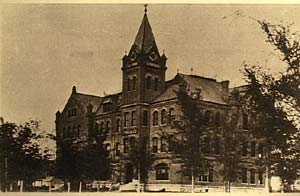 and you'll never have any trouble.' So, that's exactly what I did. My mother did a lot of sewing, making uniforms and I worked as a janitor at the school, see, and we made it all right. I was a good janitor,too....And then of course, the end of that year, I started working for the railroad." and you'll never have any trouble.' So, that's exactly what I did. My mother did a lot of sewing, making uniforms and I worked as a janitor at the school, see, and we made it all right. I was a good janitor,too....And then of course, the end of that year, I started working for the railroad." |
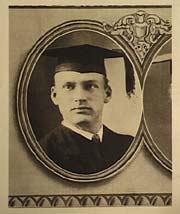 |
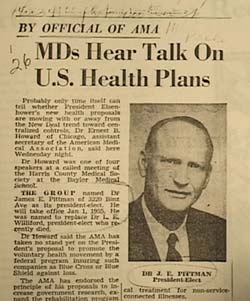 |
Talk a little about your medical career in Houston.
"What about it?'
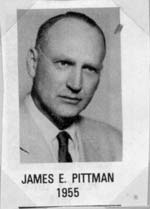 Well, you were chief of staff, right? Well, you were chief of staff, right?
"Yes, I was chief of staff and head of the surgical department."
Was that a good time?
"Well, it was a busy time. And that's where I had a fine anesthetist and we'd have these patients come in that just looked like they were gone, and I'd say to him,'Now listen, if you can keep this patient alive, I believe I can help this patient.' And we saved a lot of patients. We really did." |
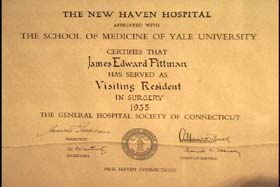 |
"The most I ever charged when I was in private practice was five hundred dollars. Five hundred dollars and that's a fact. You can't even get in the hospital now for that. And that would be the care before, during and after surgery, see."
"I always say, that's what I teach: It's up to a physician, a doctor, to do everything possible[to save a patient]. If there is any possibility-and you're not the one to tell if it's possible or not- you do all you know to do and that leaves plenty more for that Good Man up above." |
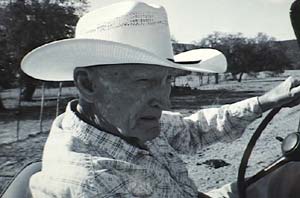
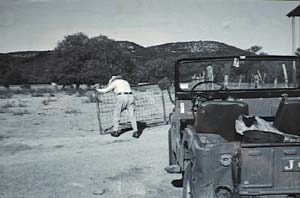
|
I know you retired from the hospital when you were 66. It must have been a big change.
"It was a big change."
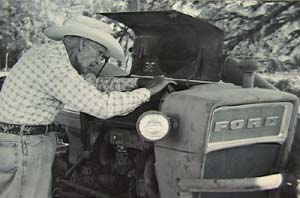
|
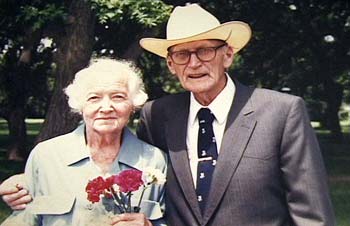 Was it a good change? Was it a good change?
"Oh, there's no question about it, see. 'Cause Merle (my wife) and I had never been able to do much together 'cause I was so busy. And then, see, I had full time with her. Look how many years we had together. Those were great years."
So, you didn't miss the hospital?
"Of course I missed it but the other outweighed it. It outweighed it."
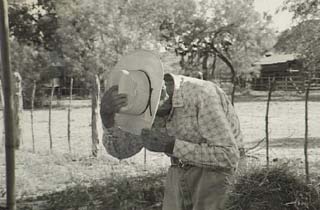 What do you think about death and the life after? Do you think there is one? What do you think about death and the life after? Do you think there is one?
"I don't know what that life is but the Bible tells us pretty well. And it's not in flesh, see, so I don't know, but I don't have to know. I know there's someone up there that's lookin' after me."
So, you don't worry about it?
"No, I don't worry about it, do you?"
|

 and you'll never have any trouble.' So, that's exactly what I did. My mother did a lot of sewing, making uniforms and I worked as a janitor at the school, see, and we made it all right. I was a good janitor,too....And then of course, the end of that year, I started working for the railroad."
and you'll never have any trouble.' So, that's exactly what I did. My mother did a lot of sewing, making uniforms and I worked as a janitor at the school, see, and we made it all right. I was a good janitor,too....And then of course, the end of that year, I started working for the railroad."

 Well, you were chief of staff, right?
Well, you were chief of staff, right?



 Was it a good change?
Was it a good change? What do you think about death and the life after? Do you think there is one?
What do you think about death and the life after? Do you think there is one?